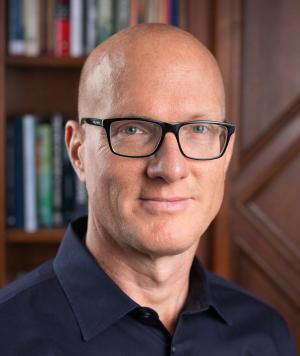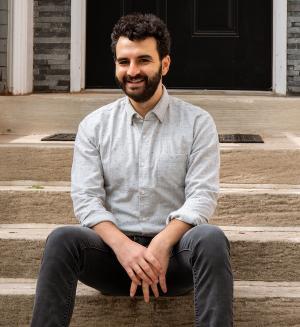
Brown University, Ph'D 02
Office Hours:
Spring Quarter 2025
https://calendly.com/jtsparrow/office-hours
BIOGRAPHY
I am an historian of modern US politics broadly construed, with special interests in the mutual constitution of social categories, democratic publics, and state formation.
My first book, Warfare State, is a history of the social politics of the national state as its foundations shifted from welfare to warfare during World War II. Its central concern is to examine the ways in which different groups of citizens encountered the burgeoning warfare state and in the process accepted, rejected, or otherwise contested the legitimacy of expanding federal authority in everyday life, thereby shaping the horizons of political possibility for decades.
I am currently completing a sequel to Warfare State tentatively titled Sovereign Discipline: The American Extraterritorial State in the Atomic Age. This book examines the mass politics of extraterritorial sovereignty, and the crisis of legitimacy it engendered, from V-E Day to the Cuban Missile Crisis. My third book project is also nearing completion. It is an intellectual history titled New Leviathan: Rethinking Sovereignty and Political Agency after Total War.
Much of this recent work is informed by a long-term collaborative research project on the problem of the democratic state, which has benefitted from two Neubauer Collegium project grants for which I am codirector ("The State as History and Theory" and "The Problem of the Democratic State in US History"), and resulted in the edited collection Boundaries of the State in US History as well as two special issues of the Tocqueville Review.
My teaching interests include both graduate and undergraduate courses on the history of US politics, diplomacy, and war; social engineering; social movements; citizenship; America in the world; the American state; and a set of undergraduate research seminars on the history of the New Deal, the early Cold War, and digital history. I am also committed to teaching in Chicago's distinctive Core Curriculum. It is one of the oldest general education curricula in the United States, engaging foundational works and questions in the humanistic social sciences for decades since the 1930s.
Recent Research / Recent Publications
Warfare State: World War II Americans and the Age of Big Government. New York: Oxford University Press, 2011.
- Honorable mention, 2012 Frederick Jackson Turner Award, Organization of American Historians.
- Review by Walter Russell Mead in Foreign Affairs (March/April 2012).
-
Boundaries of the State in US History, edited by James T. Sparrow, William J. Novak, and Stephen W. Sawyer . Chicago: University of Chicago Press, 2015.
-
"Beyond Stateless Democracy," edited by William J. Novak, Stephen W. Sawyer, and James T. Sparrow, special issue, Tocqueville Review 36, no. 1 (2015).
-
"The History of the French and American States," edited by Stephen W. Sawyer, William J. Novak, and James T. Sparrow, special issue, Tocqueville Review 33, no. 2 (2012).
-
"Democratic States of Un-Exception: Towards a New Genealogy of the American Political," coauthored with William J. Novak and Stephen W. Sawyer. In Many Hands of the State, edited by Kimberly Morgan and Ann Orloff. Cambridge: Cambridge University Press, in press.
-
"Rumors of Empire: Tracking the Image of Britain at the Dawn of the American Century." In Boundaries of the State in US History, edited by James T. Sparrow, William J. Novak, and Stephen W. Sawyer . Chicago: University of Chicago Press, 2015.
-
"Introduction," coauthored with William J. Novak and Stephen W. Sawyer. In Boundaries of the State in US History, edited by James T. Sparrow, William J. Novak, and Stephen W. Sawyer. Chicago: University of Chicago Press, 2015.
-
"Morgenthau's Dilemma: Rethinking the Democratic Leviathan in the Atomic Age." In "Beyond Stateless Democracy, edited by William J. Novak, Stephen W. Sawyer, and James T. Sparrow, special issue, Tocqueville Review 36, no. 1 (2015).
-
"Beyond Stateless Democracy," coauthored with William J. Novak and Stephen W. Sawyer, In "Beyond Stateless Democracy, special issue, Tocqueville Review 36, no. 1 (2015).
-
"Behind the Atomic Curtain: School Desegregation and Territoriality in the Early Cold War." In "The History of the French and American States, edited by Stephen W. Sawyer, William J. Novak, and James T. Sparrow, special edition, Tocqueville Review 33, no. 2 (2012): 115–139.
-
"Toward a History of the Democratic State," coauthored with William J. Novak and Stephen W. Sawyer. In "The History of the French and American States, special edition, Tocqueville Review 33, no. 2 (2012): 7–18.
-
"Freedom to Want: The Federal Government and Politicized Consumption in World War II." In Fog of War: The Second World War and the Civil Rights Movement, edited by Kevin M. Kruse and Stephen Tuck. New York: Oxford University Press, 2012.
-
"A Nation in Motion: Norfolk, the Pentagon, and the Nationalization of the Metropolitan South, 1941–1953." In The Myth of Southern Exceptionalism, edited by Matthew D. Lassiter and Joseph Crespino. New York: Oxford University Press, 2010.
-
"'Buying Our Boys Back': The Mass Foundations of Fiscal Citizenship in World War II." Journal of Policy History 20, no. 2 (2008): 263–86.
-
"Hot War, Cold War: The Structures of Sociological Action, 1940–1955," coauthored with Andrew Abbott. In Sociology in America: The American Sociological Association Centennial History, edited by Craig Calhoun. Chicago: University of Chicago Press, 2007.
-
Awarded 2023 Quantrell Award for excellence in undergraduate teaching
-
Named an OAH Distinguished Lecturer
-
Co-organizes Major Project on "State as History and Theory" at the Neubauer Collegium

Yale University, PhD' 18
Office Hours
Spring Quarter 2025
https://calendly.com/gwinant
BIOGRAPHY
Gabriel Winant is a historian of the social structures of inequality in modern American capitalism. His work approaches capitalism as an expansive social order—not confined to the market alone but rather structurally composed of multiple, heterogeneous spheres. He focuses on the relationship between economic production and formal employment on the one hand, and the social reproduction and governance of the population on the other. Broadly, he is interested in transformations in the social division of labor and the making and management of social difference through this process.
His first book, The Next Shift: The Fall of Manufacturing and the Rise of Health Care in Rust Belt America investigates the rise of the “service economy” in the aftermath of manufacturing. The Next Shift locates the origins of today’s social inequality in America’s postwar political economy. Across the Rust Belt, the health care industry today dominates employment, accounting for one in five jobs in places like Detroit, Rochester, Baltimore, and Pittsburgh. As the care economy has grown, it has been an engine of insecurity for workers, who are overwhelmingly women and people of color employed at low wages and in precarious positions. Using Pittsburgh as a case study, The Next Shift shows how deindustrialization triggered the ascent of the care economy and stamped it with the inequalities produced by the New Deal state’s hierarchies of race and gender.
His second project, tentatively titled Our Weary Years: How the Working Class Survived Industrial America, explores similar problems in an earlier period. This project will examine the relationship between several key historical phenomena in capitalist development at the turn of the twentieth century: the survival strategies of new migrants in cities like Chicago and New York—often involving practices that were cooperative, informal, illicit, or illegal; the rise of mass production and the ensuing large-scale imbalances between production and consumption; and the construction and contestation of a new set of norms against informal, cooperative, and illicit—that is, non-market—survival strategies and the social worlds that sustained them.
Before coming to the University of Chicago, Winant was a visiting scholar at the American Academy of Arts and Sciences. He also writes frequently for publications such as the Nation, Dissent, and n+1.
Recent Research / Recent Publications
-
The Next Shift: The Fall of Industry and the Rise of Health Care in Rust Belt America. Harvard University Press, 2021. Winner of the 2022 Frederick Jackson Turner Award.
-
"The Natural Profits of Their Years of Labor: Mass Production, Family, and the Politics of Old Age," forthcoming in Radical History Review 139 (January 2021).
-
“Anomalies and Continuities: Positivism and Historicism on Inequality,” Journal of the Gilded Age and Progressive Era 19, no. 2 (April 2020), 285-295.
-
“‘Hard Times Make for Hard Arteries and Hard Livers’: Deindustrialization, Biopolitics, and the Making of a New Working Class,” Journal of Social History 53, no. 1 (Fall 2019), 107-132.
-
“Inner Dialogue,” History Workshop Journal 87 (Spring 2019), 301-310.
-
“A Place to Die: Nursing Home Abuse and the Political Economy of the 1970s,” Journal of American History 105, no. 1 (June 2018), 96–120.
-
“The Making of Nickel and Dimed: Barbara Ehrenreich and the Exposé of Class in America,” Labor 15, no. 1 (Feb. 2018), 67–79.
-
“Conflict and Consensus: The Steel Strike of 1959 and the Anatomy of the New Deal Order,” coauthored with Kristoffer Smemo and Samir Sonti, Critical Historical Studies 4, no. 1 (Spring 2017), 39–73.
-
“‘Green Pastures of Plenty from Dry Desert Ground’: Nature, Labor, and the Growth and Structure of a California Grape Company,” Enterprise and Society 16, no. 1 (Mar. 2015), 109–40.
-
“State Agency: Social History with and beyond Institutionalism.” Under review for Brent Cebul, Lily Geismer, and Mason Williams, eds., New Histories of Liberalism, forthcoming.
-
“The Fissured Welfare State: Care Work, Democracy, and Public-Private Governance.” In Labor and Democracy: Constructing, Deepening, and Defending Citizenship Rights, edited by Angela B. Cornell and Mark Barenberg, 334-350. New York: Cambridge University Press, 2022.
-
Writes book review for Dissent Magazine, Summer 2019